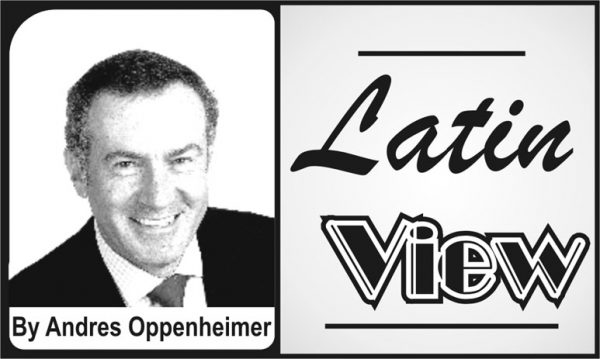 What irony! Latin America’s leftist leaders are using the tragic suicide of Peru’s former President Alan Garcia — as he was about to be arrested in the Odebrecht bribery scandal — to claim that corruption is a byproduct of free-market economies.
What irony! Latin America’s leftist leaders are using the tragic suicide of Peru’s former President Alan Garcia — as he was about to be arrested in the Odebrecht bribery scandal — to claim that corruption is a byproduct of free-market economies.
In fact, it’s exactly the opposite.
Hours after Garcia’s death on Wednesday, Mexico’s leftist populist leader, Andres Manuel López Obrador, tweeted that he regretted Garcia’s suicide “and everything around the Odebrecht case. Corruption is the world’s new pest. Neo-liberalism (the free-market economy) has mixed up private and public businesses. It’s urgent to separate economic and political powers.”
However, the Odebrecht corruption scandal was born, thrived and spread to a dozen countries during Brazil’s governments of Luiz Inacio Lula da Silva (2003-2010) and Dilma Rousseff (2011-2016). That was at the peak of Latin America’s wave of leftist populist governments, which got the bulk of the bribes.
The giant Brazilian construction firm paid about $800 million in bribes in several countries to obtain government contracts between 2001 and 2016, according to a U.S. Justice Department investigation. Consider the bribe amounts listed in the Justice Department probe, which was based on the confessions of Odebrecht’s top executives:
— While Odebrecht paid $29 million to Peru during the rule of centre-right governments in that country, the Brazilian firm paid $349 million in bribes to Brazil under the Da Silva and Rousseff governments.
— Odebrecht paid $98 million in bribes in Venezuela between 2006 and 2015, during the leftist regime of late President Hugo Chávez and current ruler Nicolás Maduro. That’s more than three times what the construction firm paid in bribes in Peru.
— Odebrecht paid $35 million in bribes in Argentina between 2007 and 2014, during the left-of-centre populist government of Cristina Fernandez de Kirchner.
— Odebrecht paid $33.5 million in bribes in Ecuador between 2007 and 2016, during the rule of leftist-populist president Rafael Correa.
By comparison, the Brazilian construction firm paid $11 million in bribes in Colombia, and $10.5 million in Mexico while the two countries were ruled by pro free-market presidents.
“What does Odebrecht have to do with free-market economies?” asked Rice University professor Francisco J. Monaldi, responding on Twitter about the López Obrador tweet that linked the Odebrecht scandal to pro-free-market governments. “That (corruption) monster developed during Lula Da Silva and the Workers Party rule in Brazil, and had its second largest expression during Chávez’s rule in Venezuela,” Monaldi added.
Part of the reason why world media are focused so much on corruption in Peru, and so little on corruption in other Latin American countries, is that Peruvian prosecutors have launched an all-out offensive against corruption. They are investigating former presidents Alejandro Toledo, Ollanta Humala, Pedro Pablo Kuczynski, and the now late Garcia, in addition to opposition leaders whose names appeared in the Odebrecht investigation.
By comparison, the government-controlled courts in Venezuela are not even investigating Maduro, who according to exiled former attorney general Luisa Ortega, received $35 million in Odebrecht bribes.
Another dangerous side effect of the Odebrecht scandal is that it may produce a populist backlash in Peru. With so many former Peruvian presidents and opposition figures such as former presidential candidate Keiko Fujimori under investigation, Peru could become fertile territory for an anti-establishment populist leader who — like Chávez in 1998 — vows to end corruption.
The perverse irony of this case is that free-market democracies like Peru that investigate government corruption are paying a high price to their reputations for it, while corruption-ridden dictatorships like Venezuela are getting a free ride.
The lesson of Odebrecht’s corruption scandal should be exactly the opposite of what Mexico’s López Obrador said in his unfortunate tweet. It should be that corruption thrives under authoritarian populist leaders who erode democratic institutions and eliminate the checks and balances needed to fight this scourge.






